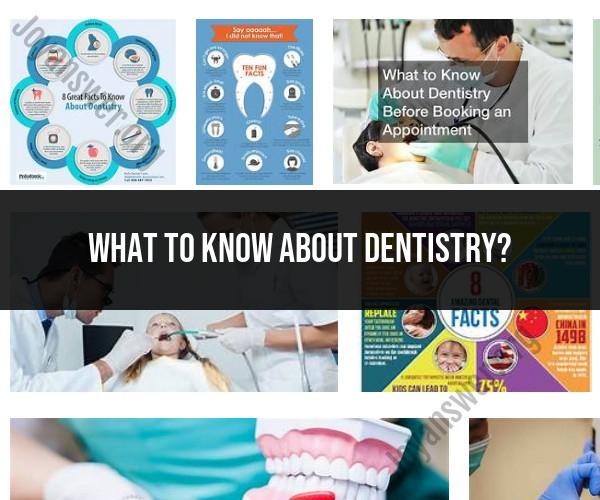What to know about dentistry?
Dentistry is a branch of healthcare focused on the diagnosis, prevention, and treatment of oral health issues. Here are some key things to know about the field of dentistry:
Oral Health: Dentistry is primarily concerned with maintaining and improving oral health. This includes the health of teeth, gums, mouth, and related structures.
Dental Professionals: Dentists are the primary healthcare professionals in the field of dentistry. They undergo extensive education and training to diagnose and treat oral health conditions. Dental hygienists and dental assistants are also essential members of the dental team, assisting dentists in patient care and oral hygiene maintenance.
Preventive Care: Preventive dentistry is a fundamental aspect of the field. Dentists emphasize regular check-ups, cleanings, and patient education to prevent dental issues such as cavities, gum disease, and oral infections.
Common Procedures: Dentists perform a wide range of procedures, including dental cleanings, fillings, root canals, extractions, and dental restorations (e.g., crowns and bridges).
Specialties: Dentistry has various specialties, including orthodontics (braces and alignment), periodontics (gum diseases), oral surgery (extraction and complex procedures), endodontics (root canal therapy), and pediatric dentistry (child-focused care), among others.
Dental Technology: Advancements in dental technology have transformed the field. Digital X-rays, 3D imaging, laser dentistry, and CAD/CAM systems have improved diagnostic capabilities and treatment outcomes.
Cosmetic Dentistry: Cosmetic dentistry focuses on enhancing the aesthetics of a patient's smile. Procedures may include teeth whitening, veneers, and cosmetic bonding.
Oral Health and Overall Health: Oral health is interconnected with overall health. Dental issues can impact systemic health, and some health conditions (e.g., diabetes) can affect oral health.
Patient Education: Dentists play a role in educating patients about proper oral hygiene practices and the importance of regular dental check-ups.
Dental Hygiene: Dental hygienists are trained to perform dental cleanings, educate patients on oral hygiene, and provide preventive care.
Oral Health for All Ages: Dentistry caters to patients of all ages, from infants to seniors. Pediatric dentists specialize in children's oral health.
Emergency Care: Dentists also provide emergency dental care, addressing issues like toothaches, dental trauma, and oral infections.
Dental Ethics: Dentists adhere to ethical standards that prioritize patient well-being, confidentiality, and informed consent.
Continuing Education: Dentistry is a dynamic field, and dental professionals are encouraged to engage in continuous learning to stay updated with the latest techniques and technologies.
Regulation: Dental practice is regulated by dental boards and licensing bodies in each country or state to ensure patient safety and the competence of dental professionals.
Patient Comfort: Dentists aim to create a comfortable and anxiety-free experience for patients, often offering sedation options for those with dental phobias.
Community Involvement: Many dentists participate in community outreach programs, providing dental care and education to underserved populations.
Oral health is integral to overall well-being, and regular dental check-ups are essential for maintaining good oral hygiene. If you have specific concerns or dental needs, it's advisable to consult a dentist or specialist for personalized care and guidance.
Dentistry 101: What Everyone Should Know
Dentistry is the branch of medicine that deals with the diagnosis, prevention, and treatment of diseases, disorders, and conditions of the oral cavity, including teeth, gums, and other tissues. Dentists are trained to identify and treat a wide range of oral health problems, including cavities, gum disease, tooth decay, and misaligned teeth. They can also perform cosmetic dentistry procedures, such as teeth whitening and veneers.
Here are some things that everyone should know about dentistry:
- Good oral health is essential for overall health. A healthy mouth can help to prevent a variety of health problems, including heart disease, stroke, and diabetes.
- It is important to see a dentist regularly for checkups and cleanings. Regular dental care can help to prevent cavities, gum disease, and other oral health problems.
- There are a variety of dental treatments available to meet the needs of each patient. Dentists can work with patients to create a treatment plan that is right for them.
- Dental insurance can help to cover the cost of dental care. Many dental insurance plans offer coverage for preventive care, such as checkups and cleanings, as well as restorative care, such as fillings and crowns.
A Comprehensive Guide to Dentistry and Its Subfields
There are a number of different subfields of dentistry, each of which focuses on a specific area of oral health. Here is a brief overview of some of the most common subfields of dentistry:
- General dentistry: General dentists provide a wide range of dental services, including preventive care, restorative care, and cosmetic dentistry.
- Pedodontics: Pedodontists, also known as pediatric dentists, specialize in the dental care of children.
- Orthodontics: Orthodontists specialize in the diagnosis, prevention, and treatment of malocclusions, or misaligned teeth and jaws.
- Periodontics: Periodontists specialize in the diagnosis, prevention, and treatment of gum disease.
- Endodontics: Endodontists specialize in the diagnosis and treatment of diseases and conditions of the dental pulp, or the nerve and blood supply to the tooth.
- Prosthodontics: Prosthodontists specialize in the restoration and replacement of missing or damaged teeth.
- Oral and maxillofacial surgery: Oral and maxillofacial surgeons specialize in the diagnosis, prevention, and treatment of diseases, disorders, and injuries of the mouth, jaws, and face.
Common Questions and Answers About the Field of Dentistry
Here are some common questions and answers about the field of dentistry:
Q: What is the difference between a dentist and a dental hygienist?
A: Dentists are doctors who have completed dental school and have a license to practice dentistry. Dental hygienists are allied health professionals who have completed dental hygiene school and have a license to practice dental hygiene. Dental hygienists work under the supervision of dentists to provide preventive care, such as cleanings and fluoride treatments.
Q: How often should I see a dentist?
A: The American Dental Association recommends that most people see a dentist for a checkup and cleaning every six months. However, some people may need to see a dentist more often, such as if they have a history of gum disease or cavities.
Q: What are some common dental procedures?
A: Some common dental procedures include:
- Fillings: Fillings are used to repair cavities.
- Crowns: Crowns are used to cover and protect damaged or weakened teeth.
- Bridges: Bridges are used to replace missing teeth.
- Root canals: Root canals are used to treat infected teeth.
- Implants: Implants are used to replace missing teeth with artificial roots.
Q: How much does dental care cost?
A: The cost of dental care varies depending on the type of treatment and the patient's insurance coverage. However, most dental insurance plans cover a portion of the cost of preventive care and restorative care.
If you have any other questions about dentistry, please talk to your dentist. They can help you to understand your individual oral health needs and create a treatment plan that is right for you.












